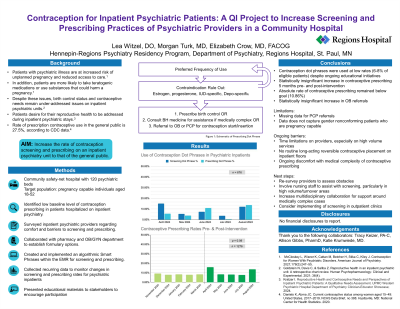Women's Mental Health
(224) Contraception for Inpatient Psychiatric Patients: A QI Project to Increase Screening and Prescribing Practices of Psychiatric Providers in a Community Hospital

- LW
Lea Witzel, DO
Psychiatry Resident
Regions Hospital
Minneapolis, Minnesota - EC
Elizabeth A. Crow, MD FACOG
Psychiatrist
Regions Hospital
St Paul, Minnesota 
Morgan Turk, MD
Resident Physician
Regions Hospital
Minneapolis, Minnesota
Presenting Author(s)
Co-Author(s)
Background/Significance: Research has demonstrated an elevated risk of unintended pregnancy in patients with mental health disorders. Conversely, untreated mental illness carries significant risks for unintended pregnancies. It has been shown that co-management of reproductive choice along with mental illness improves outcomes for patient’s mental health and their pregnancies (McCloskey, et al., 2021). Despite this evidence, the issue of contraception remains under-addressed during inpatient psychiatric hospitalizations (Goldstein, et al., 2021). Utilizing a quality improvement approach, we aim to improve the rate of contraception prescribing on the 120 bed inpatient psychiatry unit at our community hospital. Conclusion/Implications: Integrating an interactive tool in the electronic medical record may be an effective mechanism to increase access to contraception on inpatient psychiatric units. Unplanned pregnancy and unplanned mental health disorders are strongly associated and interconnected, though access to care can be limited for patients with mental health diagnoses. More research is needed to identify barriers in access to reproductive health care to better address the needs of patients with mental illness.
Methods: Utilizing chart review, we established the baseline rate of contraception prescribing during encounters with pregnancy-capable patients over a 6 month period. We then administered a survey to psychiatric providers on our inpatient units assessing comfortability with screening for and prescribing contraception. In collaboration with the Ob/Gyn department, behavioral health medicine team, and psychiatric pharmacists, we determined methods of contraception to have available on our formulary. We then created an interactive template within the electronic medical record to guide psychiatric providers through prescribing a variety of contraceptive options that considers pre-existing patient preferences, medical conditions, and medication interactions. We plan to collect post-intervention data by screening the rate of contraception prescribed during relevant encounters over a subsequent two-month period.
Results: Our initial data collection demonstrates that only 2.6% of eligible psychiatric inpatients were prescribed contraception during admission. Additionally, our surveys of providers on inpatient psychiatry have revealed that a large portion of providers feel comfortable screening for contraceptive needs (75%), but very few feel comfortable prescribing contraception (10%). Completed post-intervention data collection will occur over the spring and summer of 2024.
Discussion: On inpatient psychiatry units at a large community hospital, rates of contraception prescribing for pregnancy-capable patients were very low, consistent with previously established data (Goldstein, et al. 2021). Through the provision of an EMR template aimed at navigating the prescribing of contraception, we anticipate the contraceptive prescribing rate and provider comfortability with prescribing will increase significantly. If successful, this quality improvement intervention can serve as a simple and cost-effective template for ongoing interventions to address both patient and provider barriers in access to reproductive care.
References:
Presentation Eligibility: Not previously published or presented
Diversity, Equity, and Inclusion: This QI project aims to increase access to contraception among psychiatric inpatients. Individuals with psychiatric disorders have a higher likelihood of unplanned pregnancy, which can interact deleteriously with other social determinants of health including educational attainment, financial security, and adverse childhood experiences. This project is conducted at a community hospital that serves a large population of individuals experiencing SPMI, housing insecurity, poor access to care, and other structural barriers. The practice of prescribing contraception for psychiatric patients requires multidisciplinary collaboration between medical specialties. Our authors reflect this, with a double board-certified Ob/Gyn and Psychiatrist and resident trainees.

